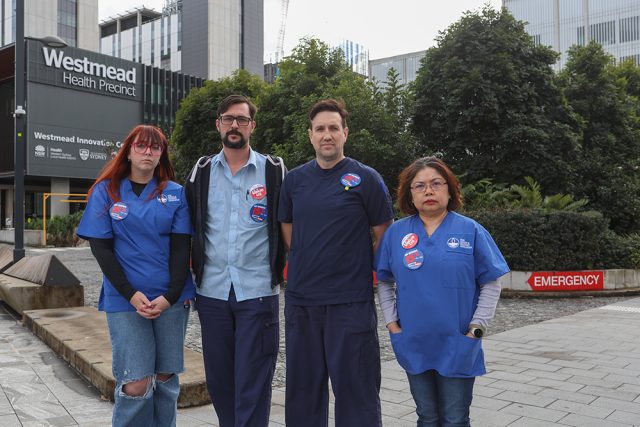From shootings to stabbings, hospitals in western Sydney are continuing to take the brunt of violent assaults. Now hospital staff are saying enough is enough.
On June 22, a 39-year-old man allegedly assaulted four hospital staff at Westmead Hospital.
He cut two security guards with a knife, while a third security guard had his shoulder dislocated and a male nurse sustained minor injuries. He was later arrested and charged with five offences.
It’s only the latest violent attack hospital staff in western Sydney have faced.
There were almost 1,000 assaults recorded on hospital grounds from March 2023 to 2024, according to the latest data from the Bureau of Crime Statistics and Research.
It’s almost double the number of assaults that were recorded 10 years ago.
The highest number of assaults were recorded in western Sydney, with 105 incidents in the Penrith Local Government Area (LGA). Hospitals in Sydney and Randwick were close behind, followed by the Parramatta LGA, which recorded 60 assaults.

Nurse Teaghanne Sarina, who works as a Health and Safety representative to the Emergency Mental Health Assessment Area within Westmead Hospital’s Emergency Department (ED), was recently assaulted herself by a patient.
“We had a patient that was under the influence of illicit substances, had a history of drug abuse psychosis,” she told the Weekender.
“He appeared to be cooperative at the time, he asked for a pillow, I walked in, he stood up and kicked me in the chest and broke my ribs.
“He went from being polite and courteous to agitated and spitting at security, kicking me in the chest, screaming about… I think his delusions were fixated on the Government being demons from the underground. It was such a rapid change of events – there was nothing we could do.”
Westmead Hospital ICU nurse of almost 30 years and NSW Nurses and Midwives Association (NSWNMA) Branch Secretary Wing Besilos said there have been many times where hospital staff have been verbally abused and threatened with everything from IV poles to scissors.
She believes the growing population of western Sydney combined with the short staffing of nurses and a lack of beds for patients all contribute towards the rising number of assaults against hospital staff.
“We have security personnel who are not trained in de-escalation, like for example here in ICU whenever we call them sometimes they tell us they can’t touch the patient. So, what are they here for?” she said.
“It’s probably going to be more productive if we properly staff ED, get more beds so that patients don’t have to wait 24 hours in the waiting area for the doctor, or be seen and be told to go back to the waiting area because there’s no bed in ED.
“Nursing patients in the waiting area is really bad, so that would contribute to anxiety and aggression.”
Sarina, who is also the Assistant Branch Secretary at the NSWNMA Cumberland Hospital branch, added that there needs to be more community resources to help those who are struggling with their mental health.

“I want to see the acknowledgement of the violence of these patients. We are seeing more and more presentations of mental health in the community because we’ve got less and less resources community-wise to help manage it effectively,” she said.
“Our community teams are so overwhelmed, so under-resourced, so understaffed, so under-funded that by the time these patients are presenting to us in ED they are presenting in such a state that the only thing we can do to manage them is to sedate them.
“I think if we’re going to look at solving the problem with the over-influx of aggressive and violent patients to the ED, first and foremost we need to look at the supply in the community.”
Calling for greater security numbers and protection, Health Services Union NSW Secretary Gerard Hayes said the senseless violence against health and hospital workers is horrifying.
“For the workers on the receiving end, the trauma will continue long after the physical scars have healed,” he said.
“For the last decade we have had shootings, stabbings and flesh torn from the bodies of our members.

“We have argued consistently for greater security numbers and powers, and will continue to push for this and better personal protective equipment.”
It comes as the NSW Government announces it will undertake a 12-month trial of body worn cameras for security staff in selected public hospitals.
The trial is part of the ongoing implementation of recommendations from the Anderson Review of Hospital Security.
Up to 300 body worn cameras will be in operation across NSW hospitals when the trial begins to test whether they are an effective tool for security staff, as well as potentially collect vision that could be used as evidence in prosecutions.
Planning work is currently underway to ensure privacy and security processes are in place to support the commencement of the trial in public hospitals as soon as possible.
Nepean Hospital and Westmead Hospital will be two of the nine sites participating in the trial.
“The safety of our healthcare staff and patients is a priority and the NSW Government has a zero-tolerance approach to violence and aggression in our public hospitals,” NSW Minister for Health Ryan Park said.

“The trend in assaults in our hospitals is unacceptable and we are taking action.”
Hayes said the trial is a “great first step” but there is still more to be done.
However, both Besilos and Sarina fear the cameras may only heighten aggression among patients.
“The body cameras won’t stop the aggression, it will just document it and probably escalate the aggression,” Besilos added.
“I have a feeling that this might actually escalate patient responses and patient violence,” Sarina said.

Ellie Busby
Ellie Busby is a news reporter for Western Sydney Publishing Group. A graduate of the University of Hertfordshire and Western Sydney University, she is a journalism Major. Ellie has worked with Universal Media, The Cova Project and for a range of other projects.

